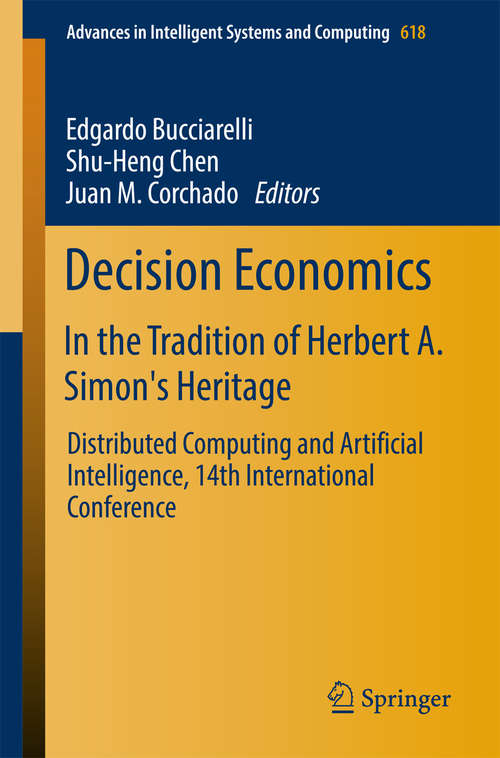Decision Economics: In the Tradition of Herbert A. Simon's Heritage
By: and and
Sign Up Now!
Already a Member? Log In
You must be logged into Bookshare to access this title.
Learn about membership options,
or view our freely available titles.
- Synopsis
- The special session on Decision Economics (DECON) is a scientific forum held annually which works to share ideas, projects, research results, models and experiences associated with the complexity of behavioural decision processes and socio‐economic phenomena. DECON 2017 took place at the Polytechnic of Porto,ISEP, Portugal, as part of the 14th International Conference on Distributed Computing and Artificial Intelligence. For the second consecutive year, the Editors of this book have drawn inspiration from Herbert A. Simon''s immense body of work and claimed that Simon has precipitated something like a revolution in microeconomics focused on the concept of decision‐making. In the entire history of scientific progress, very few scientists produce seminal works in more than one field: Herbert A. Simon was one of them. Nonetheless, no other single scientist has won the Nobel Memorial Prize for Economics (1978), the Turing Award of the Association for Computing Machinery (shared with Allen Newell, 1975), the Orsa/Ti s John von Neumann Theory Prize (1988), the Distinguished Scientific Contribution Award of the American Psychological Association in 1969 and the National Medal of Science in 1986. That is exactly what happened to Herbert Alexander Simon. In the tradition of Simon''s interdisciplinary heritage, this book is dedicated to the study of decision‐making involving different fields of expertise and across several fields of study. It is worth noting that the recognition of relevant decision‐making takes place in a range of critical subject areas and research fields, including economics, finance, information systems, small and international business, management, operations, and production. Therefore, decision‐making issues are of fundamental importance in all branches of economics addressed both deductively and inductively. Not surprisingly, the study of decision‐making has seen growing empirical research efforts in the economic literature over the last sixty years and, more recently, a variety of insightful cutting‐edge experimental, behavioural and computational approaches. Additionally, the awareness regarding generalizations and reductions to express economic concepts has led, on the one hand, to an increasing risk in spreading the language of mathematics as a rhetorical tool and, on the other hand, to oversimplify and overlook some crucial details especially when to comes to human decisions and, hence, economic behaviour. That awareness, however, has helped to produce an extraordinary volume of empirical research aimed at discovering how economic agents cope with complex decisions. In this sense, the international scientific community acknowledges Herbert A. Simon''s research endeavors to understand the processes involved in economic decision‐making and their implications for the advancement of economic professions. Within the field of decision‐making, indeed, Simon''s rejection of standard decision‐making models of neoclassical economics inspired social scientists worldwide to develop research programs in order to study decision‐making empirically. The main achievements regard decision‐making for individuals, firms, markets, governments, institutions, and, last but not least, science and research.
- Copyright:
- 2018
Book Details
- Book Quality:
- Publisher Quality
- ISBN-13:
- 9783319608822
- Publisher:
- Springer International Publishing, Cham
- Date of Addition:
- 07/12/17
- Copyrighted By:
- Springer
- Adult content:
- No
- Language:
- English
- Has Image Descriptions:
- No
- Categories:
- Nonfiction, Business and Finance
- Submitted By:
- Bookshare Staff
- Usage Restrictions:
- This is a copyrighted book.
